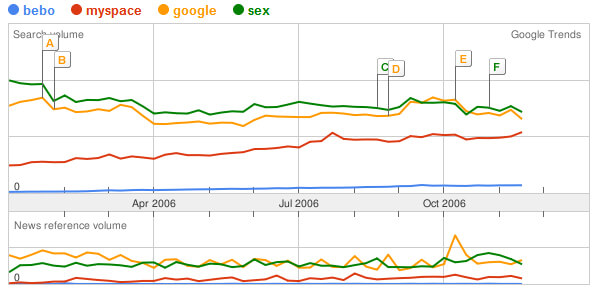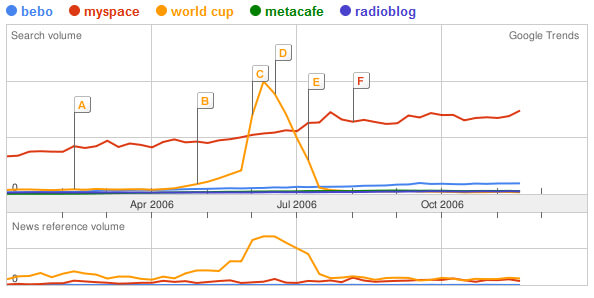The Lies Of Top Search Terms Of The Year
I wanted to make some time and dive deep into the issue of why all those top search terms from the various search engines don’t match. Others have thankfully been doing that. The short answer, as I’ve written before, is that they are all heavily filtered. That’s why you don’t see popular terms like […]

I wanted to make some time and dive deep into the issue of why all those top search terms from the various search engines don’t match. Others have thankfully been doing that. The short answer, as I’ve written
before, is that they are all heavily filtered. That’s why you don’t see popular terms like “sex” and “porn” and navigational queries like “google” showing up. I might try to come back to this in more depth, but here’s a summary of the lists and what people are saying about them. Plus, I’ll explain that chart above and how it shows that list from Google doesn’t match what Google’s own Google Trends says.
Dweebs, horndogs and geezers from Nick Carr at Rough Type has a nice short thought piece, and Techdirt does a succinct kick-in-the-knees to these lists, as does Business 2.0. Via Nick’s post, here’s a nice chart of top queries going back over time. Techmeme also points you to related posts centering around Nick’s article. Greg Jarboe looks at top news queries versus web queries. That’s interesting, but by this point, you’re probably losing faith that any of these lists actually match the reality of what people search for :)
Now back to the chart above. I know from past articles that sex is one of the most popular search terms, consistently over time. I also know that lots of people search for sites like Google even on Google. So I took the top two terms Google says were most popular in 2006 — bebo at #1 and myspace at #2 — and checked them against sex and google using Google Trends. If the top two terms were really that popular, they should be well above the ones I’m guessing at.
Nope. They weren’t (chart is for 2006, all regions). Sex as a search term almost consistently showed more volume than any of the other terms. Google as a term was right up there with it. MySpace is even far, far above Bebo.
Next I put all top five queries that Google said were tops for 2006:
- bebo
- myspace
- world cup
- metacafe
- radioblog
Computer says no:

Just for fun, I tried a last chart, putting terms I know are popular like “yahoo,” “hotmail” and “amazon” against the supposed number two and number four terms. The chart:

Oh, need the lists? Here’s our past posts on them or links to them:
- Top Google Search Terms Of 2006
- Top Yahoo Search Terms Of 2006
- Top Searches At Windows Live Search (MSN Search) For 2006
- AOL’s Top Searches Of 2006
- Top Searches At LYCOS In 2006
Postscript: I’m talking with Google later today about the stats, but the Washington Post has an article up now — A Search For Ourselves — that confirms some of this.
Google said its annual list does not reflect the most-searched-for terms by volume; rather, it selects the fastest-growing search terms and removes those that are always very popular, such as searches for Web sites that host free e-mail accounts or adult content. Google does not reveal how many searches it takes to reach the top 10, but it said millions of searches are conducted each day.
“We view Google as the entryway for things to the Internet,” Merrill said. “We’re looking for things that have changed this year and what’s new and interesting.”
Of course, that’s not what the Google press release on the top terms says:
Google Year-End Zeitgeist Highlights Most Popular Search Queries and Trends
of 2006Social networking sites top the list this year’s most searched queries
Google today announced its annual Zeitgeist, featuring lists and charts of
the most popular and fastest-rising global search terms that people have typed
into Google.com. If you’re interested in revisiting this year’s top scandals,
or learning who wins in a Suri vs. Shiloh face-off, or which sport is most
popular – visit https://www.google.com/intl/en/press/zeitgeist2006.html to read
all about what spurred people’s collective curiosity in 2006.This year’s Google Zeitgeist reveals the following trends:
* What’s hot: the who, what and how of what’s being searched
* Current events: top searched scandals, political figures and global regions* Milestones: most searched divorces, weddings, deaths and births of 2006
* Entertainment: what movies and TV shows were hot this year
* Sports: top searched sporting events, who retired and whose jerseys were
most sought after
Most popular. Not fastest growing. Not most interesting. Yes, the regular
Google Zeitgeist has
focused on “gaining” queries since it began years ago. But the
year-end
Zeitgeist is pretty clearly saying most popular:
A year’s worth of search speaks to our collective consciousness, and 2006
is no exception. To compile these year-end lists and graphs, we reviewed a
variety of the most popular search terms that people typed into Google. Click
on all the tabs to learn something new — or confirm that you too reflect the
spirit of the times. Except where noted, all of these search terms are global
for Google.com.
Nothing on the home page suggests that “Top Searches” means the most
interesting/fastest growing searches after Google’s removed whatever it wants.
Rich Skenta also
notes that
from his days at Netscape, the most popular search term is no search term at all
— people doing blank searches.
Contributing authors are invited to create content for Search Engine Land and are chosen for their expertise and contribution to the search community. Our contributors work under the oversight of the editorial staff and contributions are checked for quality and relevance to our readers. The opinions they express are their own.
Related stories